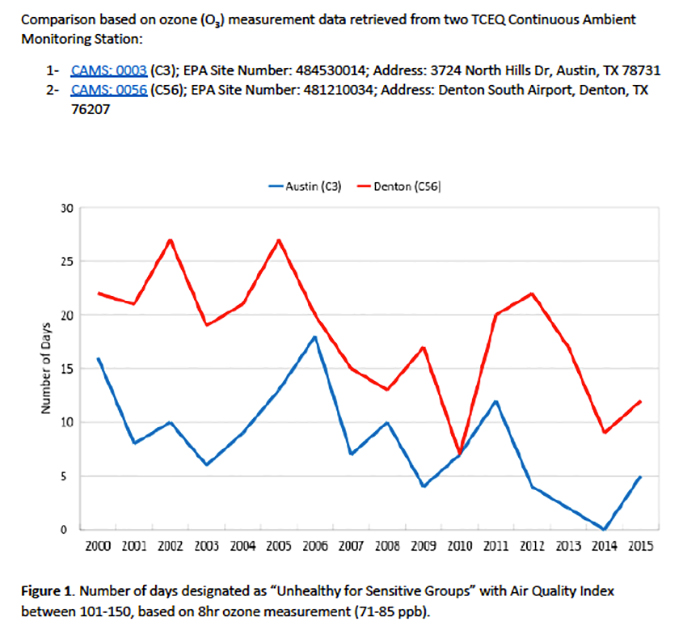
It’s been said that Denton resident’s are fundamentalist for opposing natural gas power plant(s) in town when Austin, the most progressive city in Texas, is planning on using a natural gas power plant.
Austin’s air reality is dramatically different from Denton’s air reality so this is not an apples to apples comparison.
Residents of Denton have requested a systematic evaluation of air impacts from the proposed natural gas power plant(s). Why is the city refusing to grant residents this request?
Below are graphs compiled from TCEQ air monitoring station data by Mahdi Ahmadi. These graphs compare current and past air quality realities in Austin and Denton. Even if Austin’s decision to invest in gas power plant is justified, it is not that straightforward to copy them here in Denton. Here is the simple reason: air quality in Denton has been much worse than in Austin, despite Denton being a much smaller city with significantly less traffic.
Air quality based on ozone is much worse in Denton. A comparison of volatile organic compound VOC data should also be made.
On December 15, 2015, the Denton City Council had a public hearing on DME’s “Renewable Denton” plan. Only two people spoke in favor of the natural gas power plants.
Mahdi Ahmadi spoke at 7:26. Here is a loose transcript of his comments with some direct quotes in parenthesis. I urge you to listen to his entire presentation, which is only about 5 minutes with questions.
Used TCEQ numbers.
What would happen if they reduced emissions at 3 major sources:
- Fracking
- 5 coal-fired power plants – not including Gibbons Creek
- cement kilns in Ellis county
Denton ozone is due to an “unfortunate combination of geography, weather, and new sources such as fracking, population and traffic.”
“What you might not know is how hard it is to get it down. It’s almost impossible and especially and particularly for Denton to lower down ozone and to comply with the national standard.”
We ran different simulations, we had 17 different scenarios.
“I’m just giving you an example of how hard it is.”
“One of the scenarios included:
- 19% NOx reduction at 5 coal-fired power plants
- 19 % NOx reduction at cement kilns
- 50 % NOx reduction at Barnett Shale compressors
What we got in Denton was 1 ppb ozone reduction. That was the only thing we got.”
Note: Dr. Ahmadi said this is a more accurate statement. “would reduce Future Year Ozone Design value by 1 ppb.at the Denton Airport South monitor.”
These power plants are just going to introduce more ozone.”I can tell you that Introducing new sources of NOx and VOC, because these engines for the power plants are going to have more VOCs than NOx, as far as I know, is just going to introduce more ozone.”
“Divesting in Gibbons Creek is not going to reduce pollution. It’s going to give the control over that part of the pollution to someone else who doesn’t live here in Denton. Because they are not going to shut it down.”
“What I suggest is: Do not install a new major source of NOx or VOCs in Denton.”
Kevin Roden brings hypothetical case where all cities were going to 70% like Denton. Would that help Denton’s air?
“Yes, but not as much as you expect because …”
Speaking directly to Kevin Roden: “What you can do is to protect the citizens of Denton by not introducing new sources of emissions.”
My comment: 1ppb reduction is not much.
The presentation that Ahmadi was not able to show council that night is below. Note recommendations on last three slides
Presentation to Denton City Council
About Sharon Wilson
Sharon Wilson is considered a leading citizen expert on the impacts of shale oil and gas extraction. She is the go-to person whether it’s top EPA officials from D.C., national and international news networks, or residents facing the shock of eminent domain and the devastating environmental effects of natural gas development in their backyards.
- Web |
- More Posts(5121)